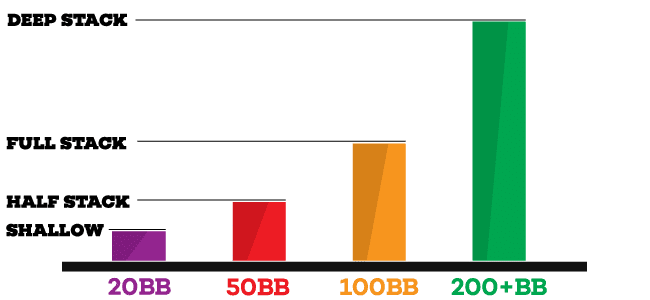How’s it going guys? I just finished a hand history review with one of my students and a lot of his questions had to do with deep stack situations. It was an interesting discussion, so this month I decided to elaborate on general deep stack concepts. I guess I’ll start by saying a deep stack is usually over 200bb’s. When stacks are this deep the focus shifts from starting hands that can flop top pair, top kicker to trying to flop the nuts or close to it. That’s why televised cash games are always so loose and wild. The stacks are almost always over 200bb’s.

So if our goal is to flop a nutted hand, how should our starting hand selection change? Firstly, small pocket pairs become more valuable because they can flop sets. Secondly, small suited connectors become more valuable because they can flop disguised two pairs, straights, and combo draws. Thirdly, suited one-gappers like 86s become much more profitable in ways that you wouldn’t expect.
When stacks are extremely deep these hands become the new aces. The reason gapped hands become more valuable is because they flop straights that aren’t readily noticeable. It’s really easy to see the four boards that 87s can flop a straight on: JT9, T96, 965, and 654. The other thing is that someone can flop a higher straight with KQ on a JT9 board. Now consider the three flops that 86s flops a straight on: T97, 975, and 754. Sure, someone could flop a higher straight on a T97 board, but how often are people playing J8? I would rather be able to flop three disguised straights versus four noticeable straights.
So why is flopping a straight so important? It’s important if you consider the hands that you will get all of the money in against on the flop — primarily two pair, sets, and combo draws. Few people are getting over 200bb’s in with just an overpair anymore. When you open or call an open with 86s, it’s your way of punishing the set-miners and maximizing value postflop. I know it doesn’t happen very often. If you play live poker everyday this situation only comes up about once every two weeks. But when it does it puts you up several hundred big blinds. That’s not even considering all the times that you flop a straight draw and end up making a disguised straight or all the times you choose a good spot to semi-bluff or make a light call. The same theory applies. Deception is crucial if you want to be on the good side of these huge pots.
“…When you open or call an open with 8♠6♠ it’s your way of punishing the set-miners…”
The next thing that you might start to notice is that when people 3-bet you, suddenly you have that 20x+ margin to start set-mining with small pocket pairs again. So what should our thought process be? Firstly, know thy enemy. If your opponent is a competent loose-aggressive player you should probably just give-up your small pocket pairs. The times that you don’t flop a set he is probably going to fire multiple streets, with overcards, and generally make your life miserable. The times that you flop a set he is unlikely to have a very strong hand, and, even if he does, he is probably good enough to lay it down when facing substantial action.
Who are we targeting? We are targeting players that only 3-bet a range of JJ+ or tighter. Players that throw AK into the mix make it a lot harder for us to create profitable situations because now we have to flop a set with an ace or king on the board. If you have a good handle on how aggressive your opponent will be with AK when he misses, that can swing a call back into consideration; however, our primary targets are the JJ+ 3-bettors. So now you might notice that one of the best adjustments you can make is to begin opening all poker pairs from every position if you’re at a table with several of these players.
Raise all pocket pairs from every position? Yes, none of the nits at the table are going to try to exploit you. Nits are nits. They have one strategy and it never changes. They only 3-bet big pocket pairs and since they wait so long to get them they will rarely fold them post-flop. A cautionary note: if there are 2-3 players that are actually capable of adjusting, you may need to remove these hands from your range if they start barraging you with light 3-bets. One other thing, if you raise JJ or QQ from UTG and call a 3-bet by a nit, remember that you are just set-mining. When the board comes 742r, you should just check-fold. I know it’s tempting to “see if he has AK.” Remember WHY you called the 3-bet in the first place. Your opponent’s range is too tight, he isn’t able to fold a big pair post-flop, and you are solely trying to flop a set against him.
Lastly, when stacks aren’t deep enough to set-mine you need to be disciplined enough to fold hands like JJ and QQ pre-flop. One of my friends was sweating me in a 5/10NL game at the Isle in Pompano Beach the other day. I opened QQ UTG, got called by the BTN, got 3-bet by a nit with 80BB’s, and I snap-folded. The BTN was a LAG online player that decided to call the 3-bet with nines, call every street, and get stacked by kings. Remember that there are no absolutes in poker. If someone’s range dictates folding QQ pre-flop, just do it and don’t think twice about it.
Other than that, now you know how to beat these games. Nits are terrible post-flop. As a result, they shouldn’t be playing stacks deeper than 60bb’s. They are going to play solid all day until this situation I described comes up. Then they will light 300bb’s on fire and go complain to the rest of their nitty friends that some crazy, tall guy got lucky against them. It’s funny that somehow I pay the bills every month when I play poker that bad…


This article made me jizz in my pants.
Very interesting article,I would like to see more like this specifically on playing deep stacks.
maybe a video ?
Yes, I will likely be making a video on this topic soon. Cheers!